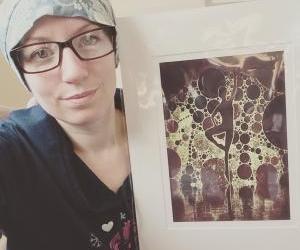
Getting my autism diagnosis and dropping my mask
Carrie
Email successfully sent
close windowMy name is Carrie and I was diagnosed at the age of 35. At first I struggled to accept the diagnosis but now I am proud of what I have achieved. I am learning what autism means for me and working hard to drop my mask.
Early life
When I was four years old a speech therapist told my mother that my inability to speak would right itself. A GP told her not to worry about my severe sleep problems and that I was simply a fussy eater for only eating jam sandwiches and yogurt.
The self-harm and eating disorder I developed as a teen was put down to depression and when I tried to end my life aged eighteen, I was called selfish by the nurse who pumped my stomach.
For ten years psychiatrists struggled to pin down a label. Eventually they gave up and misdiagnosed me with bipolar disorder, mixed anxiety disorder and borderline personality disorder. My meltdowns were misdiagnosed as “non epileptic seizures”.
Getting a diagnosis
A neuropsychologist first mentioned autism in 2009. We’d talked about the difficulties I had making friends and he noted my above average IQ and strong visual processing skills and photographic memory. But when I asked my doctor if I could be assessed she told me autism only affects boys, and they grow out of it.
Thankfully my wife a few years later encouraged me to self-refer for an assessment. She told the diagnostic team how I find it hard to talk on the phone and that I walk away from a conversation when I have had enough. She described my brutal meltdowns - rocking, wailing and hurting myself and how she can’t calm me down because I can’t stand being touched.
My mother told them how I never sought cuddles or affection as a baby, how I taught myself to read as a toddler and fixated on subjects.
In 2016, nine years later, it was agreed that I was autistic.
What autism means to me
The problem is, I don’t look autistic because, like many autistic women, I mask my autism. I hide it after a lifetime of being taught by family, teachers and friends that my stimming is embarrassing and that I must make eye contact with people.
Autism is me as a little girl crying and squeezing my hands over my ears because the hoover is deafening. It's me, alone in my room, pacing and flapping. That same little girl was top of her class and popular at school.
Autism is I, the grown woman rocking in the corner of my room hitting my head and sobbing because something is out of place. It is the mask I wear to work as a freelance writer and artist.
Autism is I, and all the other women who fall through the cracks because medical professionals do not understand little girls with autism.
Why research matters
Research is desperately needed to ensure that young girls don’t suffer because their therapists and GPs don’t ask the right questions.
Autistica are working with other providers and people with autism to ensure that we learn more about the condition. They are listening to women on the spectrum to understand how we can diagnose and support girls better.
Related Articles
High-functioning respect
This guest post is by Ryan Lee and Bekki Semenova, two rising autism self-advocates. They are calling for more ..
Why autism functioning labels are harmful -- and what to say instead
Commonly, when you hear someone say they know someone who is on the autism spectrum, you immediately hear them ..
I have autism, and I'm in college
I knew I wanted to go to college at a medium-sized private institution on the East Coast. I knew I wanted to s ..

